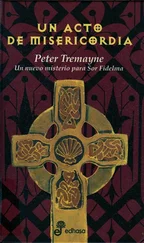Peter Tremayne - Act of Mercy
Здесь есть возможность читать онлайн «Peter Tremayne - Act of Mercy» весь текст электронной книги совершенно бесплатно (целиком полную версию без сокращений). В некоторых случаях можно слушать аудио, скачать через торрент в формате fb2 и присутствует краткое содержание. Год выпуска: 2011, Издательство: St. Martin, Жанр: Исторический детектив, на английском языке. Описание произведения, (предисловие) а так же отзывы посетителей доступны на портале библиотеки ЛибКат.
- Название:Act of Mercy
- Автор:
- Издательство:St. Martin
- Жанр:
- Год:2011
- ISBN:нет данных
- Рейтинг книги:4 / 5. Голосов: 1
-
Избранное:Добавить в избранное
- Отзывы:
-
Ваша оценка:
- 80
- 1
- 2
- 3
- 4
- 5
Act of Mercy: краткое содержание, описание и аннотация
Предлагаем к чтению аннотацию, описание, краткое содержание или предисловие (зависит от того, что написал сам автор книги «Act of Mercy»). Если вы не нашли необходимую информацию о книге — напишите в комментариях, мы постараемся отыскать её.
Act of Mercy — читать онлайн бесплатно полную книгу (весь текст) целиком
Ниже представлен текст книги, разбитый по страницам. Система сохранения места последней прочитанной страницы, позволяет с удобством читать онлайн бесплатно книгу «Act of Mercy», без необходимости каждый раз заново искать на чём Вы остановились. Поставьте закладку, и сможете в любой момент перейти на страницу, на которой закончили чтение.
Интервал:
Закладка:
When she was a young student, under her mentor the Brehon Morann of Tara, Fidelma had been surprised to learn that there were even laws relating to dress. The Senchus Mor laid down the rules relating to the dress laws of children in fosterage. Each child had to have two complete sets of clothes so that one might be worn while the other was being washed. The clothes of the sons and daughters of kings, then chiefs … going down to those of the lower ranks in society, were all enumerated according to their social grades and, while in fosterage — the form of receiving education — children had always to be dressed in their best on festival days.
Fidelma caught herself musing on these things and suddenly felt a pang of isolation. How she wished that Eadulf were here! At least she could talk with him about such matters, even if they did tend to disagree. She badly needed his help in trying to solve this puzzle. Perhaps he could see something which she had overlooked.
She saw that Gurvan was standing with a long length of rope, his eyes averted from her.
‘I am ready, Gurvan. I swear, I am decently clothed.’
Gurvan reluctantly raised his eyes.
It was true that Fidelma’s garments were not outrageous but neither did they entirely hide her well-proportioned figure; a youthful form that seemed to vibrate with the joy of a life at odds with her religious calling.
He swallowed nervously.
‘Show me how to tie this rope around me,’ she coaxed him.
He moved forward, the rope end in his hand.
‘It is best to fix it round your waist, lady. I shall tie a secure knot that is also easy to undo — a reef-knot.’
‘I have seen how it is tied. Let me try it and you can check that I have done so correctly.’
She took the rope end from his hands and placed it around her waist and then, concentrating, she turned the rope.
‘Right over left and left over right … isn’t that the way?’
Gurvan examined the knot and gave his approval.
‘Exactly right. I shall tie the other end by a similar knot to the rail here.’
He suited his words to action. The rope was long enough for her to swim the entire length of the ship and back.
Fidelma raised her hand in acknowledgement, went to the rail and dived gracefully over the side.
The water was colder than she was expecting, and she came up from the dive gasping and almost winded at the impact. It took her a few moments to recover and grow used to the temperature. She took a few lazy strokes. Fidelma had learnt to swim almost before she had begun to toddle, in the Suir River, called the ‘sister river’, which flowed a short distance from Cashel. She had no fear of water, simply a healthy respect for it, for she knew what it was capable of.
Among the people of Eireann, it was a curiosity that while many of the inland folk learnt to swim in the rivers, most of those who lived in coastal fishing communities, particularly along the West coast, refused to learn. Fidelma remembered asking an old fisherman the reason for this because if their boats sank, surely it was necessary to be able to swim? He had shaken his head.
‘If our boats sink, then better to go straight to a watery grave than die a longer and more agonised death trying to survive in these seas.’
It was true that the brooding, rocky coastline with its frothy, angry waters was no place to go swimming. Perhaps the old fisherman had a point.
‘If God wants us to live then He will save us. There is no use struggling against fate.’
Fidelma had not pursued the conversation for it was not a subject of which most fishermen would speak. Indeed, the greatest curse that anyone could pronounce among these coastal folk was ‘A death from drowning on you!’
Fidelma lay back, floating on the rippling waters. The great black outline of The Barnacle Goose loomed high above her; the great sail wasstill hanging limply from the yard. She could see the dark form of Gurvan peering over the rail at her and she raised a languid arm and waved at him to indicate she was all right. He nodded and turned away.
Sighing, she closed her eyes, feeling the soft warmth of the sunshine on her face. The saltwater dried on her lips and she resisted the temptation to lick it off. She knew how incredibly thirsty it would make her.
Now she began to cast her mind over the situation but, try as she would, she could not concentrate entirely on the loss of poor Sister Muirgel. Instead, Cian came to mind. Cian! It was strange that immediately, words from the Book of Jeremiah came into her mind. ‘You have played the harlot with many lovers; can you come back to me?’ She shivered slightly. Why had that come to mind? Well, she knew that the words were apposite, but why quote Holy Scripture at all? There had been enough passages from Scripture quoted on this voyage! Perhaps it was catching.
She felt a moment of sympathetic sadness for Cian over his wound which had prevented him pursuing the profession of a warrior. She knew how his life had been governed by his physical prowess. He was vanity itself; vain of his body, vain of his ability with weapons, and vain of his belief that youthfulness was immortality. Wasn’t it Aristotle who had said that the young are permanently in a state of intoxication? That was the very word to describe the youthful Cian. He was intoxicated by his own youth, for youth was immortal; only the elderly grew old in his world.
That was what had attracted her to him. His youth. His power. He had few intellectual attributes. He knew how to ride well; he knew how to cast a javelin with great accuracy; he knew how to thrust and parry with a sword and use his shield to protect his body; he knew how to shoot an arrow from a bow. The only intellectual pursuit he had come close to following was stratagem in warfare.
Cian never tired of telling the story of the High King Aedh Mac Ainmirech who, sixty years before, had been defeated by the Laigin King, Brandubh, who had smuggled his warriors into the High King’s encampment concealed in hampers of provisions.
Fidelma had not been especially interested in the story, but had tried to persuade Cian into playing games of Black Raven and Wooden Wisdom, with the idea of using these games to explore military strategy. Even that had not interested Cian. Such board games were a matter of frustration for him.
Now with his useless right arm, he could no longer be a warrior. She had seen he was unable to adjust and cope with his new rolein life. The idea of Cian as a religieux was inconceivable. He had already demonstrated his bitterness and anger at his misfortune. His silly attempt to assert his idea of his masculinity as a compensation was pathetic in her eyes. That was not something that Eadulf would have done. The words of Virgil’s Aenid drifted into her mind. ‘Tu ne cede maluis sed contra audentior ito’ — yield not to misfortunes, but advance all the more boldly against them. That would be Eadulf’s attitude, but Cian with his useless arm …
Her body stiffened in the water.
His useless arm! How could Cian have left the ship at midnight and rowed himself to the island all alone? It would have been impossible to row the skiff with one arm. And the skiff! Dear Lord, what was happening to her powers of observation? If he had, by some miracle, managed to propel the skiff to the island from the ship, how had the skiff been returned to the ship? Someone had rowed Cian to the island and then returned to the ship.
Eadulf would have spotted that. Oh God, how she needed him. She had grown so used to talking things out with him and considering his advice.
She stirred self-consciously as she realised in what direction her thoughts were travelling. She should have thought of this before, instead of day-dreaming. The effect of floating in the gentle waves was too soporific and …
Читать дальшеИнтервал:
Закладка:
Похожие книги на «Act of Mercy»
Представляем Вашему вниманию похожие книги на «Act of Mercy» списком для выбора. Мы отобрали схожую по названию и смыслу литературу в надежде предоставить читателям больше вариантов отыскать новые, интересные, ещё непрочитанные произведения.
Обсуждение, отзывы о книге «Act of Mercy» и просто собственные мнения читателей. Оставьте ваши комментарии, напишите, что Вы думаете о произведении, его смысле или главных героях. Укажите что конкретно понравилось, а что нет, и почему Вы так считаете.











